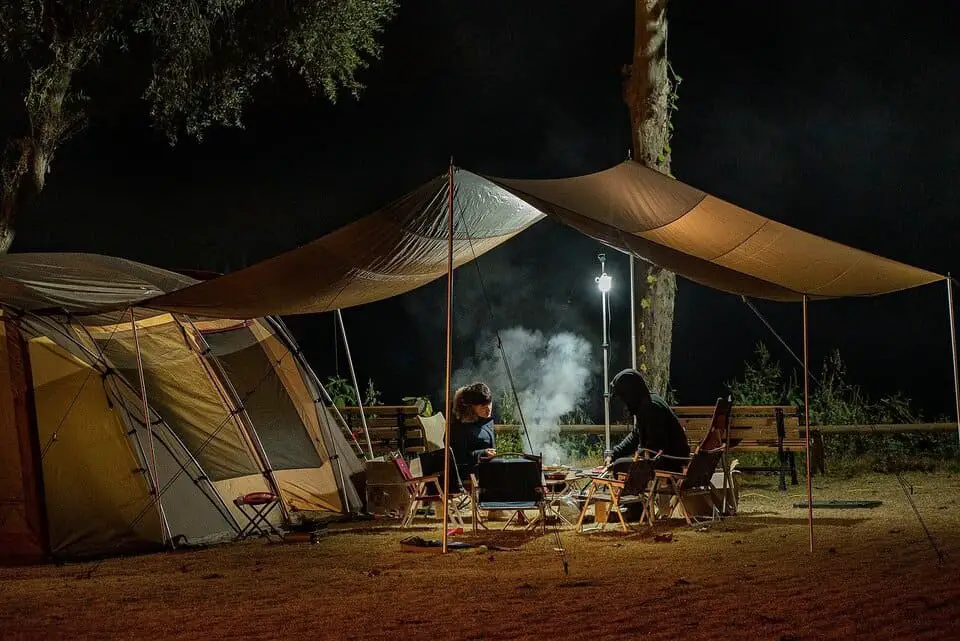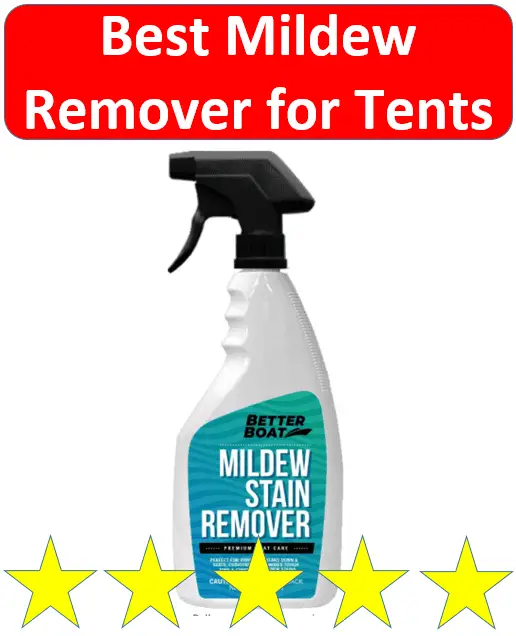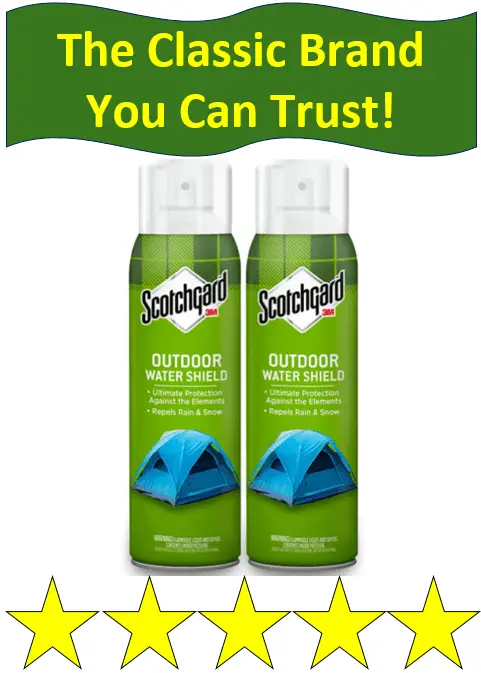Camping is an amazing experience and one of my favorite hobbies. My family has camped for as long as I can remember, and sometimes for weeks or months on end when traveling. And the end of a whole family sleeping in a tent for weeks on end…the tent can carry some odors. That’s for sure.
Keeping a tent clean is extremely important not just for convenience but also for safety. Mold and mildew can cause serious health problems and will occur on tents that aren’t properly cleaned…and can appear even on those that are well taken care of but see heavy use over enough time.
Experienced campers know the best way to clean a smelly tent starts with washing with soap and a mixture of water, lemon juice, vinegar, and salt. After a thorough wash and dry further work might be needed with smell removals, mildew removal, coffee grounds, and more.
Want all the inside secrets from decades of camping experience? Read on for a thoroughly clean and fresh smelling tent you can get ready to bring back out to the wild.

How to Clean a Smelly Tent
There are several great methods we’ve used for cleaning out a smelly tent, and whether from sheer amount of time out and about, someone being sick, or a lot of wet weather threatening mildew, cleaning a smelly tent is important to keep the tent in good shape and usable.
There are multiple methods depending on how serious the smell is, and we’ll go through the steps that apply to all tent cleaning processes before moving to the specifics that tend to get the rougher, trickier jobs done when it comes to cleaning and disinfecting a tent.
There are several options that work better than soap and water…so don’t fear if that original combination has let you down before.
What You Will Need
- Soap and water
- Lemon juice
- Vinegar
- Salt
- Tub
- Outdoor clothes line to air dry tent
- Febreeze (optional)
- Mold & Mildew Removal Enzyme Cleaner (Situational)
- Tent waterproofing spray (situational)
- Coffee grounds (Situational)
Step 1: Spot Clean the Tent
No matter what method or combination of methods are going to be used for cleaning out a smelly tent, this has to be the first step. If the root cause isn’t cleaned out then all you’re going to do is unsuccessfully mask the smell for a bit on the surface before it all comes back.
You want to spot clean before soaking the tent in a tub of soapy water.
1A: Mix a bucket of hot water, 1 cup of lemon juice, 1 cup of salt, and 1 cup of vinegar.*
1B: Use a cloth or sponge to scrub problem areas.
Problem areas include:
- Obvious stained areas
- Sections of the the tent that clearly are the source of the bad smell
- Any section that smells like mold or mildew
- Any spot that could be mildew, mold, or dirt
1C: After scrubbing each problem area, get a tub filled with hot water and soap.
I have heard of mixtures that don’t have the salt, mixtures that keep the lemon juice and vinegar separate, etc. Mom always just mixed them altogether and we used the same tent for 8 years despite camping 50+ days a year…so I’m trusting Mom’s tent cleaning solution!
Step 2: Wash The Tent Thoroughly
This mixture should use a soft sponge and dish soap. Wash the entire tent thoroughly, and then soak for one to three hours.
In my personal opinion and hour is enough, especially if you did the pre-scrub wash and have kept on top of making sure your tent wasn’t too smelly all the time.
A little bit of maintenance goes a long way over the long-term.
IMPORTANT: When you do this make sure the weather outside is sunny and warm and make sure there is enough time left to hang the tent up to be fully dried. You do not want a damp tent hanging for hours at a time.
Step 2: Dry Thoroughly
We always hung this up on the clothesline outside to dry and the tent lasted years, but apparently if you have nylon tents direct UV light can be harmful, which means these need to be hung in shade during a windy day or hung in a garage or similar area.
Do NOT toss a tent into a dryer under any circumstances.
That will simply destroy the tent.
Step 3: Give It The Smell Test
Make sure the tent has plenty of time to fully dry. At that point, you want to give it the smell test.
If after a thorough wash and drying the tent is still smelly, there are a couple of options for taking care of it. But to pinpoint what might be most effective there are two smells in particular that we’re looking for:
- Faint urine-like smell
- Mold/mildew smell
If there is still a bit of mold smell you may need to go through a second wash and make sure to do spot treatment with an enzyme mold and mildew remover.
You want make sure any mold or mildew is dead. We personally recommend the Better Boat Mildew Stain Remover because it’s designed for boat seats which means a mildew remover that is designed for use with fabrics. Trust me, you don’t want to roll the dice on mildew removal tile cleaner designed for bathroom use.

There are other options but you don’t want to cheap out on this. Make sure whatever mold remover you use is a high-end brand if you decide not to go with Better Boat.
Then repeat the steps for washing and drying after the mold removal has had plenty of time to do its work. Any brush you use on a problem area needs to be gentle enough to not damage the fabric (which is why old worn toothbrushes are pretty great).
Why Does My Tent Smell Like Pee?
If there is a faint smell of urine, this could actually be the waterproofing of the tent breaking down. If that’s the smell that seems to be hanging around then you will want to look at waterproofing options to reinforce it so you don’t find yourself in a tent with water coming in at the next rain storm.
If that urine smell seems to be in the tent and you’ve noticed a few more damp spots or bits of water getting in, then this is a clear sign that you may have found the culprit to your tent that smells.
In this case don’t complicate things. Scotsgard is the classic spray waterproofing and there’s a reason it’s so widely thought of that it’s pretty much synonymous with waterproofing.
Go with Scotsgard (I know some people say you don’t need the heavy duty, but in my personal experience it’s ALWAYS better to be safe than sorry – why would you risk a miserable trip and wet temp to save a dollar or two?), treat the tent, and then don’t worry about it.

Keep in mind to follow the directions perfectly to make sure that the waterproofing has had time to settle. Although almost certainly not necessary, I like to even give it a few extra hours to sit if viable. Just to be on the safe side. Once that’s done, if the smell of the waterproofing is a bit strong, or there’s still some smell of urine underneath the new coating, wash one more time.
You should be good to go at that point.
If not, then it’s time to bring out the ultimate secret to destroying the problem smells in your tent. This brings us to…
Use Coffee Grounds to Clean a Smelly Tent
This is actually a trick my dad learned while working for a car dealership as a mechanic. The power of unused coffee grounds to absorb and eliminate smells was advice given to him one day when he went to the bar and talked about a car that ran great, looked amazing, low mileage, but it had been owned by a pig farmer for years and the smell of manure was – thick.
And despite multiple professional level cleanings and shampooing nothing was getting that ingrained smell out.
I still remember that Pontiac Boneville. And how strong it smelled at first. Then how it was barely noticeable by the second change out of a tray of coffee grounds in the back.
A couple months later we didn’t need the coffee grounds at all and that $500 car became one of the biggest value steals of his life.
And it ran for many, many years, smelling just fine without an air freshener. If it works for the former car of a pig farmer that professional shampooing couldn’t fix, a tray of coffee grounds in the tent spread out in a corner of the garage can work out the same way.
Assuming the base problem is taken care of, coffee grounds are powerful for absorbing smells until there’s nothing left. And to this day – no idea why it works. But I’ve used this on apartments, on cars, on gear – and it does work.
The rest can be used to make your mornings much more manageable 🙂
Tent Cleaning Questions
I’m here to answer some of the most common tent cleaning questions.
Q: How do I get a musty smell out of my tent?
The first step is to make sure you took care of the root of the problem. Usually a musty smell is a telltale sign of mildew or mold. Examine the tent thoroughly and hit it with your favorite mold/mildew remover. Hit any area that looks even remotely suspect or where the smell is particularly strong.
Once that’s done its work to the full wash. If the mildew or mold damage was deep it might leave a musty smell behind even after its all dead in washed, it which point look for the lemon juice/vinegar solution to take that out or if desperate go for the coffee ground solution.
Seriously, those are an amazing home remedy for smell removal.
Q: I washed my tent multiple times but it still smells like mildew – why?
This probably means there was a deep damage due to mold or mildew and the smell is the residual from a long-term problem.
Q: How can I get the smell of vomit out of a tent?
Make sure the area is thoroughly cleaned. And then do a complete tent clean more than once because…well look for a video of a slow motion sneeze to understand how fast, far, and thoroughly bodily functions can go even before things like “splash” come into the equation.
Then expect to need additional air fresheners, spot cleaning, or similar work to make sure all remnants of sick smell is removed.
Q: What home items can I use to DIY clean a tent that smells?
Look above but basically if you have vinegar, lemon juice, and salt you have all you need to make a great homemade odor remover.
In Conclusion
As you see there are several options when it comes to cleaning a tent. Canvas tents take a bit more work, but you can also be a bit rougher on them when doing the deep clean.
A smelly tent isn’t any fun but with all the information you received in this article you have the knowledge (and hopefully the tool) you need in order to fix any and all problems regarding a foul-smelling tent.
Other outdoor articles you may enjoy
